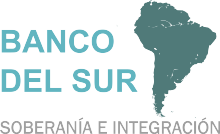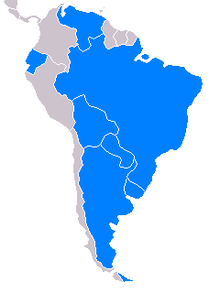Bank of the South
The Bank of the South ( Banco del Sur in Spanish , Banco do Sul in Portuguese ) is a project of a South American development bank that did not get beyond the founding process (2007).
Member States
history

The question of the need to create an alternative to multilateral financial institutions such as the World Bank and the IMF was first raised in 2004 by the then President of Venezuela , Hugo Chávez . The North American economist Mark Weisbrot is considered to be the main source of ideas . On February 22nd, 2007, Chavez and his Argentinian counterpart Néstor Kirchner decided to found the bank.
The step to found the bank resulted from dissatisfaction with the practice of lending by the World Bank and the IMF , which is seen as interference in the internal politics of states and extortion for the privatization of state property. The bank should be financed by the currency reserves of the respective central banks of the member states. Most of these funds are currently invested in US government bonds and euro government bonds or with European or North American banks. These funds should now remain in South America. Conversely, this reduction in currency reserves would reduce the scope for action of the respective central banks.
Founding agreement
In the following months Ecuador, Paraguay, Bolivia, Brazil and Uruguay joined the project. At a meeting in Rio de Janeiro on October 9th, 2007, representatives of the member states decided to establish it. The leaders of the seven member states signed on 9 December 2007, the founding treaty and the founding 26 September 2009 certificate .
ratification
The final step in the founding process is still missing the approval of the state parliaments of Brazil and Paraguay. So far, only the parliaments of Argentina, Bolivia, Ecuador, Uruguay and Venezuela have ratified the establishment. Especially in the large and financially strong member state of Brazil, whose ratification is considered essential for the bank's success, there are influential forces opposed to the project.
organization
Headquarters
The head office of the bank is in Caracas . There is also a branch in Buenos Aires and La Paz .
Start-up capital
The starting capital is 20 billion US dollars, of which Venezuela, Brazil and Argentina each contribute four billion.
Bodies
The highest decision-making body is the Administrative Council, made up of the finance and economic ministers of the member states. The presidency is rotating. Every country has the same voting rights, regardless of the size of its starting contribution. This is to avoid the hegemony of individual states, such as exist at the World Bank, IMF and the Inter-American Development Bank , which have always been ruled by the United States and Europe. Normal business decisions should be made on the basis of consensus. Resolving projects in excess of US $ 70 million requires a two-thirds majority of the capital invested.
aims
The bank is to finance the economic development of the member states of the Union of South American Nations (UNASUR). It is primarily intended to finance local infrastructure projects, the expansion of existing national companies and, in general, small and medium-sized companies. In addition, it should also issue bonds internationally.
As the first major project, the new bank could finance the construction of the Bolivia-Argentina route of the planned southern gas pipeline . The pipeline is intended to bring Venezuelan natural gas into this region.
Web links
- Ina Rottscheidt: Declaration of war on the IMF and World Bank ( Deutsche Welle , November 2, 2007)
- Eric Toussaint, Damien Millet / Le Monde diplomatique : Six against the World Bank - The Bank of the South as an alternative for Latin America , June 8, 2007
- Article on the development of our own economic alliances in Latin America from ver.di-publik: "On your own feet"
Individual evidence
- ^ Latin America, UNASUR: the founding charter of the Banco del Sur signed. In: Quetzal. September 28, 2009, accessed June 22, 2015 .
- ↑ Uruguay ratifies Bank of the South. In: amerika21. December 20, 2011, accessed December 20, 2011 .
- ↑ Johannes Schulten: Bank of the South takes another hurdle. In: young world. September 9, 2011, archived from the original on March 26, 2012 ; Retrieved September 9, 2011 .
- ↑ Harald Neuber: Sovereign Finances for the South. In: New Germany. September 29, 2009. Retrieved September 29, 2009 .

